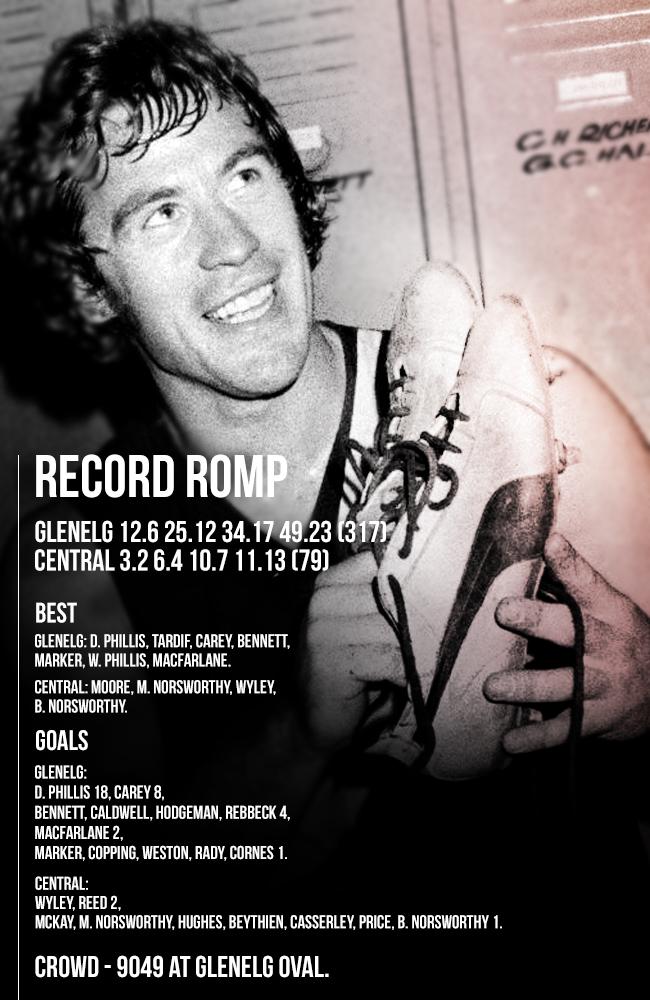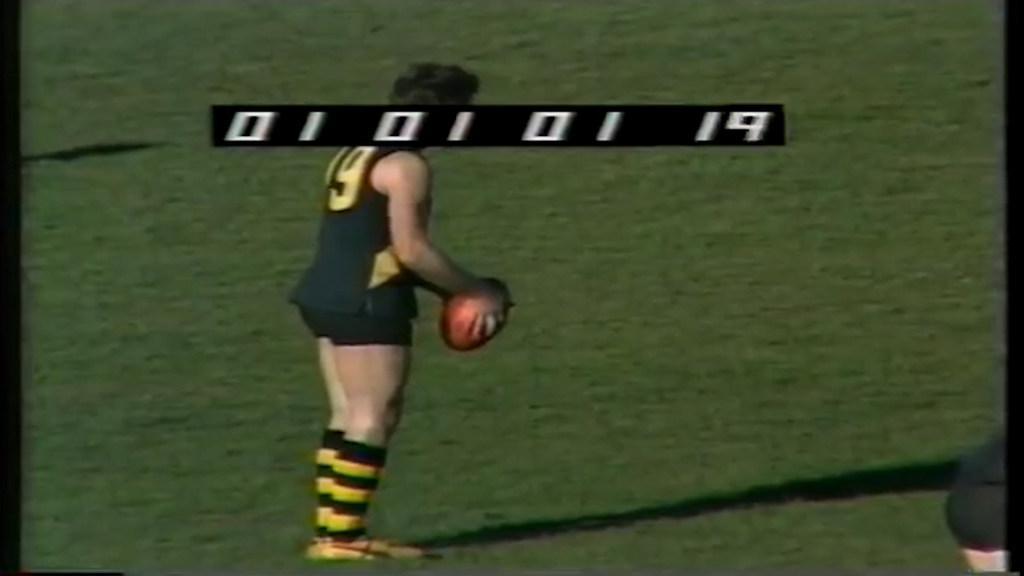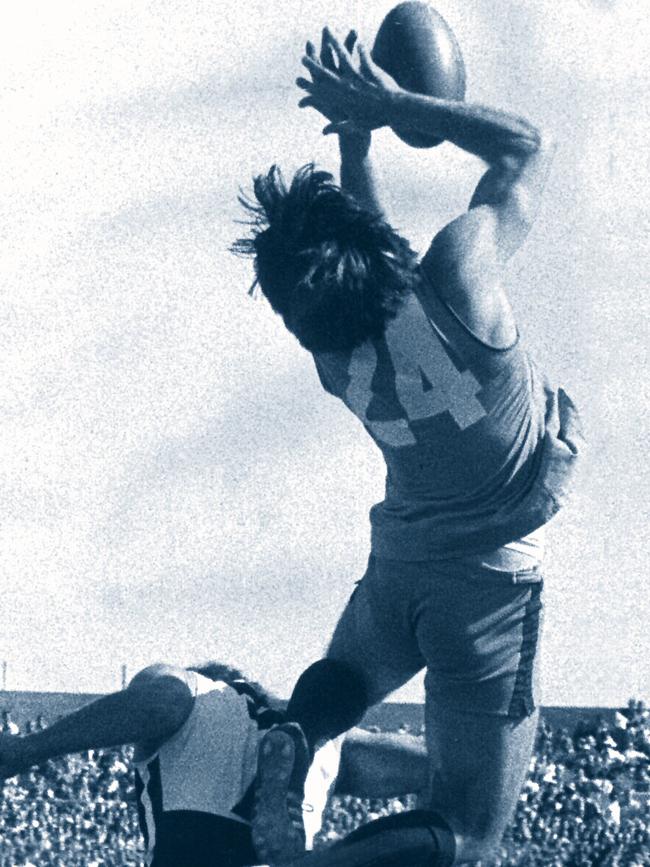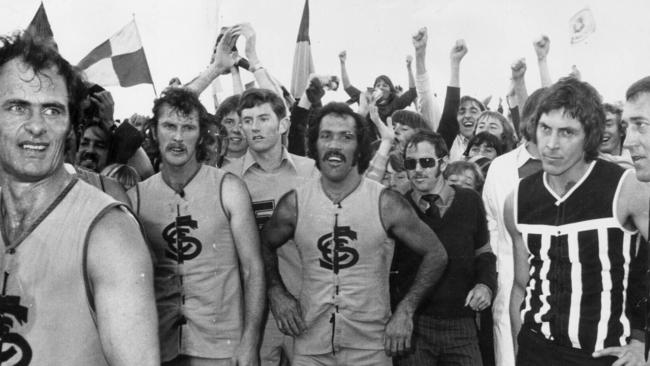JOHN MacFarlane tries to deny he was the man who kicked that behind.
“It was my brother, at least that’s what I tell people,’’ the 306-game wingman said as he recalled his flying shot that slammed into the goalpost as the siren sounded in Glenelg’s record 49-goal trouncing of Central District at the Bay in 1975.
“It’s always been a funny point, hasn’t it. I played (league football) for 17 years and the thing I get asked most about is the point that cost Glenelg a 50th goal.
“The story has grown bigger and bigger over the years.’’
On August 23, 1975, Neil Kerley’s Glenelg kicked the highest-ever SANFL score of 49.23 (317), beating the shell-shocked Bulldogs, who kicked 11.13 (79), by a remarkable 238 points.
Full forward Fred Phillis booted a SANFL-best 18.6 from 17 marks, Australian Football Hall of Famer Peter Carey bagged eight goals and midfielders Greg Bennett (48) and captain Peter Marker (47) had 95 disposals between them in a goal rampage never before seen at SANFL level.
This is unbelievable. Words cannot describe what’s going on at Glenelg Oval today.’’
The Tigers kicked 15 goals in the final quarter, prompting legendary commentator Max Hall to say: “This is unbelievable. Words cannot describe what’s going on at Glenelg Oval today.’’

Central defender Julian Swinstead would later describe the goal avalanche “like standing up against a wall and facing a machine gun loaded with footballs’’.
As the final seconds ticked away and the Tigers pushed relentlessly for a 50th goal, MacFarlane had the final two shots at the sticks.
His first with a long screw punt from just outside 50m missed narrowly to the left – “I was just trying to kick it to Fred’’ – bringing jeers from the crowd.
His second – after receiving a handball from All-Australian half-back Brian Colbey – was a running drop punt which appeared to be on target before tailing away late and hitting the left goalpost halfway up.
Graham Cornes, who was sitting on the bench, jumped for joy as the ball was in flight before putting his head in his hands as it crashed into the goalpost and the final siren sounded.
MacFarlane, nicknamed “Snout’’, said while Glenelg set all sorts of records on a day it rained goals – becoming the first league team to kick 300 or more points in a game and shattering the previous record SANFL score by more than 15 goals – Kerley made him pay for his late misses.
“Supporters flooded into the clubrooms after the game and Kerls organised for the players to file through single file and, as I lined up, he said ‘you had a pretty good game but you won’t be getting any best and fairest votes so you can go to the back of the line,’’ MacFarlane recalled.
“I thought ‘thanks very much’ but didn’t read too much into it until I was introduced to the crowd and everyone booed me.’’
Phillis, the 1969 Magarey Medal winner, kicked his 100th goal for the season with his 13th and Glenelg’s 32nd of the day before finishing the year with 128.
Asked about his big day out, in which he wore bright yellow boots, Phillis said: “I was just doing my job.

“The ball was coming down like it was being fired out of a machine gun so all I had to do was mark it, kick it and get on with the next one.
“Once we got on top we were chasing some percentage with an eye on the 50 (goals) and unfortunately, at the end, the goalpost got in the way.’’
MacFarlane believes his “poster’’ was meant to be.
When he re-enacted his kick at the Bay at the 30th anniversary celebrations of the record goal spree, his shot at goal hit the right-hand goalpost.
“So it had to be fate,’’ he said.
—Andrew Capel
One crowded hour (or two)
RICK Davies knew it would be a different grand final before he even entered the ground.
The roads around West Lakes were packed and the car park was already full when the Sturt players arrived, leaving many of them to leave their wives and girlfriends to park their cars as they made a mad dash to the team meeting.
Davies said he’d never seen a crowd like that day. Officially, there were 66,897 people but police estimated the figure was closer to 80,000.

The terraces were so packed that fans were forced to sit between the fence and boundary line.
Davies, who would be best on ground with 21 kicks, 21 handballs, 21 hit-outs and 15 marks, remembers that day well.
“I remember getting to the ground and we had to stop the car and run across to the team meeting at 1.30pm because we couldn’t get into the car park,” he recalled.
“Mike Nunan and myself ran across and were running late for the meeting.
I looked around and thought, “Sh*t, there’s no fence’
“And then when we actually got out onto the ground I looked around and thought, “Sh*t, there’s no fence’.
“You couldn’t see it because people were sitting in the seats and on the ground. But there wasn’t any sort of drama.”
Davies credits the now-defunct newspaper The News for part of the win.
The day before, it had basically written off the Double Blues and coach Jack Oatey used it as motivation.
“It basically said we had no chance of winning,” Davies said. “And of course Jack had it up on the blackboard in our Friday meeting.
“And, of course, everything went to plan.

“I don’t think there’s any question it is one of my fondest memories. I don’t think we had one passenger.
“There was not one ball that went the wrong way, there wasn’t one free that went against us (unfairly), the ball never bounced away from us.
“There wasn’t one thing that went wrong.
“I remember how (captain) Paul Bagshaw got up and said, ‘This is the finest hour of the Sturt Football Club,’ and I do honestly believe that.”
—Jesper Fjeldstad

Add your comment to this story
To join the conversation, please log in. Don't have an account? Register
Join the conversation, you are commenting as Logout
Watch the moment lifeless man yanked from burning wreckage
I was hit by a car going 170km/h and survived. No doubt about it, I should probably be dead. But after I was left unconscious, burning, trapped and helpless, something incredible happened, writes Advertiser journalist Ben Hyde.
‘I’m Afghan and feel pride every time I put on my Aussie uniform’
Kbora Ali’s dad was rescued from the Timor Sea by the Royal Australian Navy on his journey to escape persecution. Now, she is committed to serving the country that saved her family.